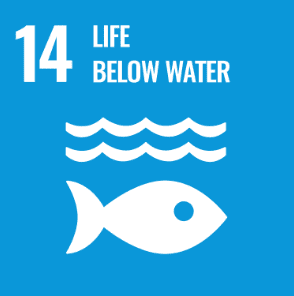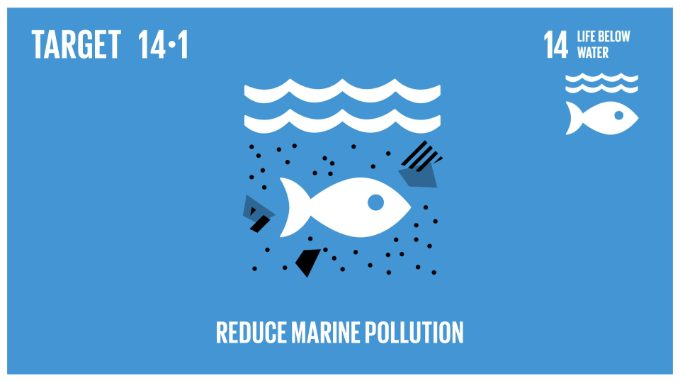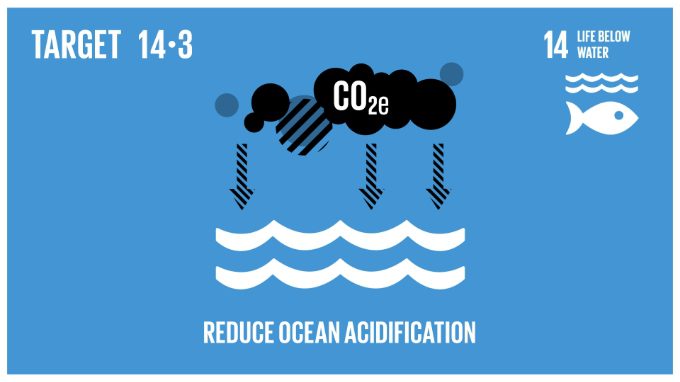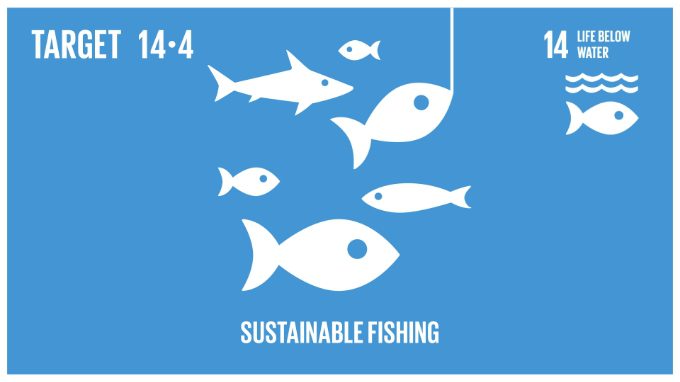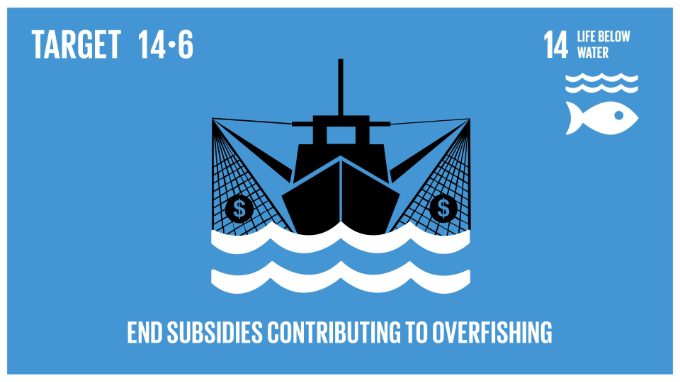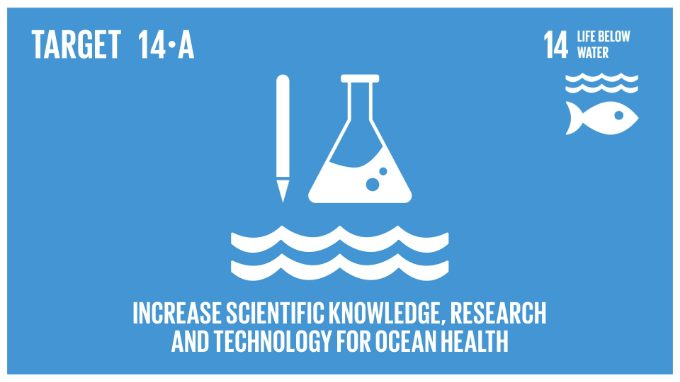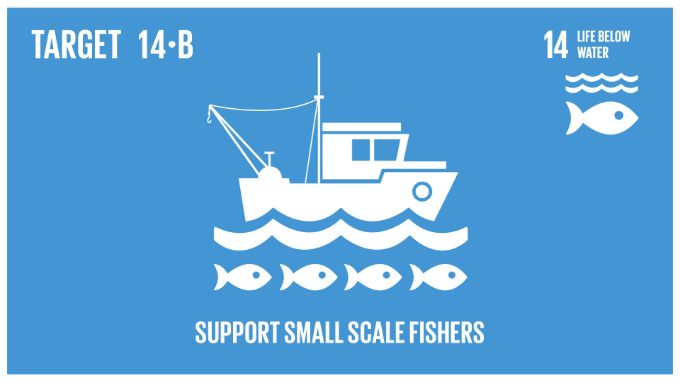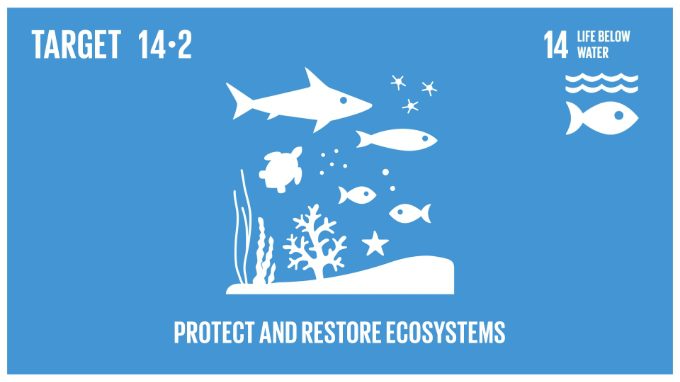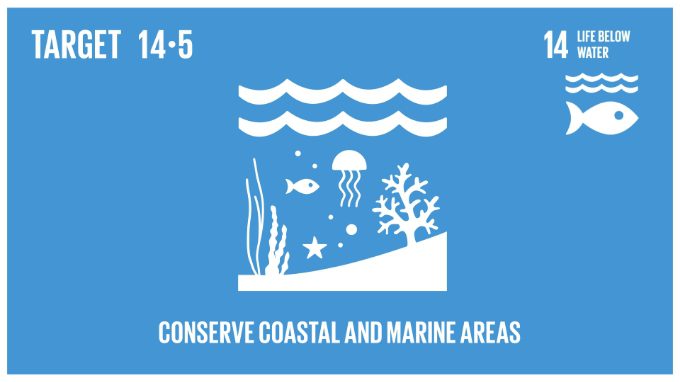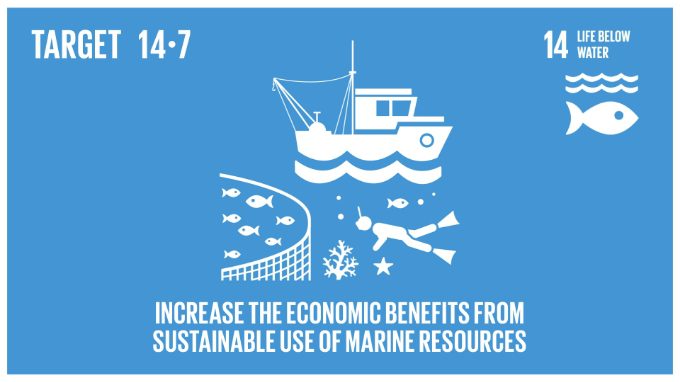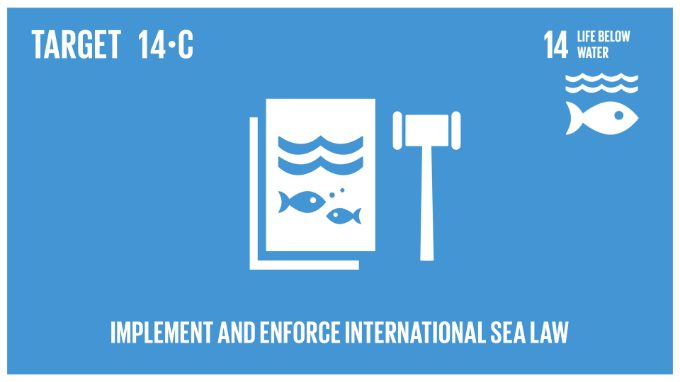Overview:
Healthy oceans and seas are essential to our existence.They cover 70 percent of our planet and we rely on them for food, energy and water. Yet, we have managed to do tremendous damage to these precious resources. We must protect them by eliminating pollution and overfishing and immediately start to responsibly manage and protect all marine life around the world.
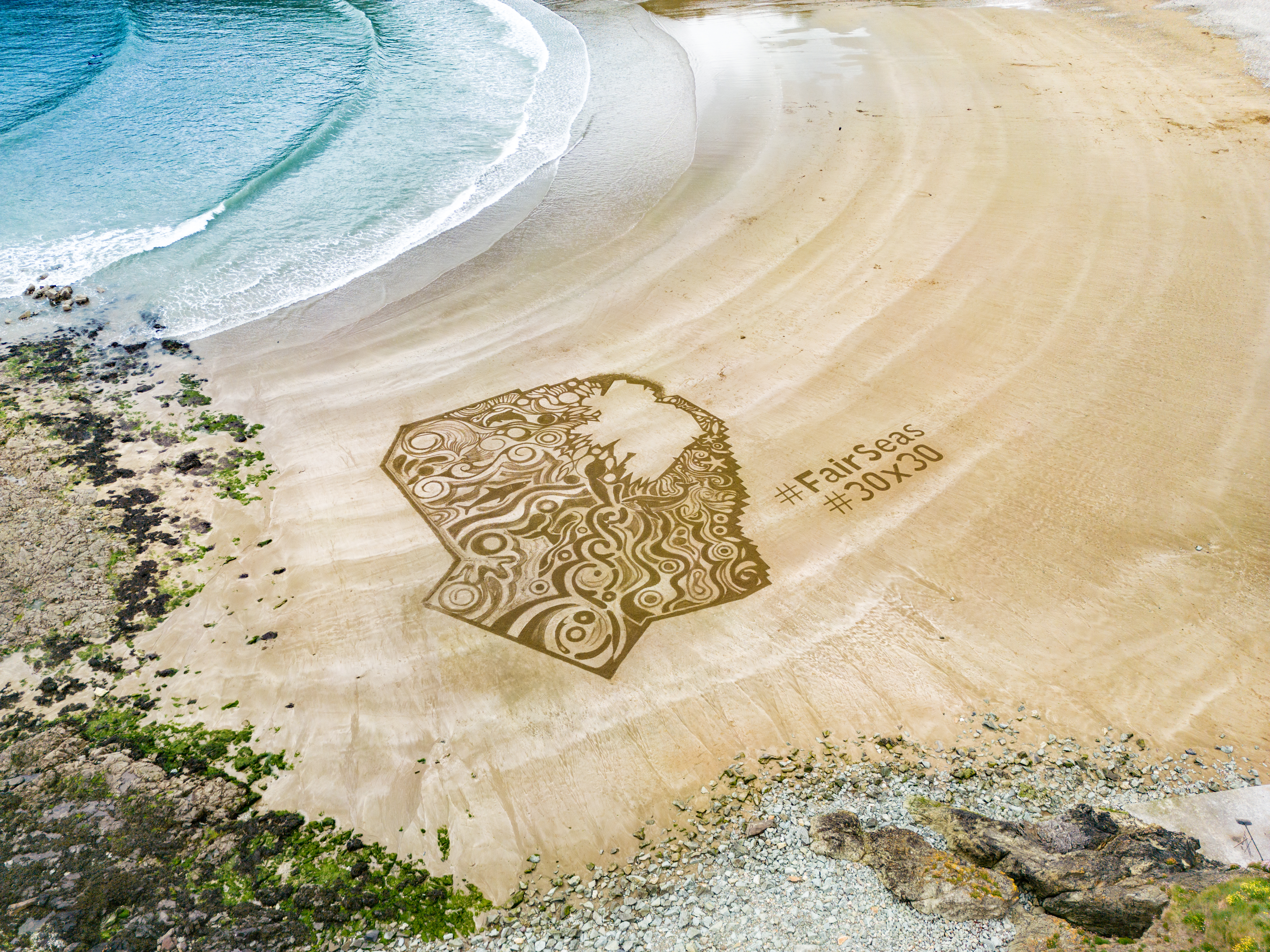
International Progress 2023:
Destructive trends in ocean health have not abated. The ocean, the world’s largest ecosystem, continues to be endangered by rising acidification, eutrophication, declining fish stocks and mounting plastic pollution.
While there has been some progress in expanding marine protected areas and combating illegal, unreported and unregulated fishing over the years, more concerted efforts and acceleration are urgently needed. Urgent and coordinated global action is needed to continue to advance towards SDG14.
Targets —
-

Target 14.1
The global trend of elevated coastal eutrophication continued in 2022 above the 2000-2004 baseline conditions, though different in magnitude from recent years. The highest rates are in the Arabian Sea.
-

Target 14.3
Ocean acidification is increasing and will continue to do so if CO2 emissions do not stop rising, threatening marine ecosystems and the services they provide. Today, the ocean’s average pH is 8.1. This means that the ocean today is about 30% more acidic than in pre-industrial times.
-

Target 14.4
Fishery resources continue to be threatened by overfishing, pollution, poor management and other factors, including illegal fishing. More than a third (35.4%) of global stocks were overfished in 2019, an increase of 1.2% since 2017. Despite ongoing deterioration, the rate of decline has decelerated in recent years. However, the trend continues to deteriorate from the 2020 target to restore fish stocks to biologically sustainable levels.
-

Target 14.6
By the end of 2022, the Agreement on Port State Measures, targeting illegal, unreported and unregulated (IUU) fishing, reached 74 Parties, (including the European Union) or effectively 100 States. In the 2018-2022 period, there has been some progress at the global level in implementing instruments to combat IUU fishing. The new WTO Agreement on Fisheries Subsidies, adopted in June 2022, marks a major step forward towards ocean sustainability.
-

Target 14.a
Even though the ocean covers more than 70% of the surface of our planet and contributes to 2.5% of the world gross value added, on average, between 2013 to 2021, only 1.1% of national research budgets were allocated for ocean science.
-

Target 14.b
Globally, the degree of application of frameworks that recognize and protect access rights for small-scale fisheries in 2022 was at the highest level based on available data, reaching a maximum score of 5 out of 5. However, this score conceals a reduced number of countries that contributed to the reporting.
Ireland’s
Progress 2023:
Ireland has committed to protecting 30% of its seas by 2030 currently designated only 9% of its marine waters as Marine Protected Areas. There is new legislation for MPAs proposed, but the Bill still has not been published, let alone passed.
A Fair Seas report found that only 31% of people in Ireland believe that Irish seas are healthy and that 67% believe the health of Irish seas has worsened in the past decade. Overfishing and poorly regulated commercial fishing activities are the main drivers of biodiversity loss in the marine environment. The Marine Institute have found that destructive forms of commercial fishing such as bottom trawling are ongoing in Marine Protected Areas, resulting in significant negative impacts on seafloor habitats.
The aquaculture sector is also poorly regulated and the expansion of fish farms and shellfish aquaculture is having an increasingly negative impact on our coastal biodiversity. For example, there is considerable evidence that there is a link between salmon farms and the spread of salmon lice to wild Atlantic salmon and sea trout which is negatively impacting on the survival of wild fish.
Targets —
-

By 2025, prevent and significantly reduce marine pollution of all kinds, in particular from land-based activities, including marine debris and nutrient pollution.
CSO data
Status: OSPAR – concern for Eutrophication & seafloor litter
14.1.1(a) Based on the satellite imagery, indicator EU SDG 14.60 shows no marine waters were affected by eutrophication for Ireland between 2015 and 2020. However, in the succeeding section OSPAR (Oslo/Paris convention (for the Protection of the Marine Environment of the North-East Atlantic)) eutrophication is a different assessment.
14.1.1(b) No data provided
14.1.1
(a) Index of coastal eutrophication; and (b) plastic debris density
-

By 2020, sustainably manage and protect marine and coastal ecosystems to avoid significant adverse impacts, including by strengthening their resilience, and take action for their restoration in order to achieve healthy and productive oceans.
CSO data
Claim: Achieving
14.2.1 Under the OSPAR Convention to Protect the Marine Environment of the North East Atlantic, Ireland committed to establishing marine protected areas to protect biodiversity (i.e., OSPAR Marine Protected Areas (MPAs)).
14.2.1
Number of countries using ecosystem-based approaches to managing marine areas
-

Minimize and address the impacts of ocean acidification, including through enhanced scientific cooperation at all levels.
CSO data
Claim: Achieving
14.3.1 An increase in anthropogenic carbon (ΔCant) of ~1 μmol kg-1 yr-1 was estimated for subsurface winter-mixed layer waters of the Rockall Trough between 1991 and 2010. This equates to a calculated pH reduction of 0.02 pH units per decade.
Decreases in pH were also calculated for deeper water masses over the 19 year period including Labrador Seawater (LSW) at 1500–2000m deep a decrease in pH of ~0.015 units per decade was calculated.14.3.1
Average marine acidity (pH) measured at agreed suite of representative sampling stations
-

By 2020, effectively regulate harvesting and end overfishing, illegal, unreported and unregulated fishing and destructive fishing practices and implement science- based management plans, in order to restore fish stocks in the shortest time feasible, at least to levels that can produce maximum sustainable yield as determined by their biological characteristics.
CSO data
Claim: Achieving
14.4.1 The number of sustainably fished stocks has increased to 35 (just under half the stocks evaluated 47%). The percentage (15%) and number of stocks (11) overfished has continued to decrease. The number of stocks with unknown status has remained the same at 28 (38%).
14.4.1
Proportion of fish stocks within biologically sustainable levels
-

By 2020, conserve at least 10 per cent of coastal and marine areas, consistent with national and international law and based on the best available scientific information.
CSO data
Claim: Achieving
14.5.1 In 2020 Ireland had a marine protected area network of 10,420 Km2, encompassing 2.13% of its total maritime area of 488,762 Km2.
14.5.1
Coverage of protected areas in relation to marine areas
-

By 2020, prohibit certain forms of fisheries subsidies which contribute to overcapacity and overfishing, eliminate subsidies that contribute to illegal, unreported and unregulated fishing and refrain from introducing new such subsidies, recognizing that appropriate and effective special and differential treatment for developing and least developed countries should be an integral part of the World Trade Organization fisheries subsidies negotiation.
CSO data
Claim: Achieving
14.6.1 Illegal, Unreported and Unregulated (IUU) fishing in Ireland is regulated by the EU Regulation establishing a community system to prevent, deter and eliminate illegal, unreported and unregulated fishing. The Common Fisheries Policy (CFP) provides a framework for the Union to cooperate with third countries and international organisations for the purposes of improving compliance with international measures, including IUU. Information is available from Ireland’s Sea-Fisheries Protection Authority website on IUU legislation.
14.6.1
Degree of implementation of international instruments aiming to combat illegal, unreported and unregulated fishing
-

By 2030, increase the economic benefits to small island developing States and least developed countries from the sustainable use of marine resources, including through sustainable management of fisheries, aquaculture and tourism.
CSO data
Claim: Achieving
14.7.1 The Output and Value Added ESA2010 for Fishing and Aquaculture Sector increased from €387 million in 2015 to €445 million in 2020.
14.7.1
Sustainable fisheries as a percentage of GDP in small island developing States, least developed countries and all countries
-

Increase scientific knowledge, develop research capacity and transfer marine technology, taking into account the Intergovernmental Oceanographic Commission Criteria and Guidelines on the Transfer of Marine Technology, in order to improve ocean health and to enhance the contribution of marine biodiversity to the development of developing countries, in particular small island developing States and least developed countries.
CSO data
Claim: Achieving
14.a.1 The Marine Institute reported an allocation of €2.4 million to research in the field of marine technology in 2018.
14.a.1
Proportion of total research budget allocated to research in the field of marine technology
-

Provide access for small-scale artisanal fishers to marine resources and markets.
CSO data
Claim: Achieving
14.b.1 Irish Government co-funding for the European Maritime and Fisheries Fund 2014-2020 programme is €91.6 million.
14.b.1
Degree of application of a legal/regulatory/ policy/institutional framework which recognizes and protects access rights for small-scale fisheries
-

Enhance the conservation and sustainable use of oceans and their resources by implementing international law as reflected in the United Nations Convention on the Law of the Sea, which provides the legal framework for the conservation and sustainable use of oceans and their resources, as recalled in paragraph 158 of “The future we want”
CSO data
Claim: Achieving
14.c.1 According to the division for Ocean Affairs and the Law of the Sea, Office of Legal Affairs, United Nations Secretariat, Ireland scored 100% in the implementation and ratification of UNCLOS and its two implementing agreements in 2021. Ireland also scored 100% for the ratification of and accession to UNCLOS and its two implementing agreements in 2021.
14.c.1
Number of countries making progress in ratifying, accepting and implementing through legal, policy and institutional frameworks, ocean-related instruments that implement international law, as reflected in the United Nation Convention on the Law of the Sea, for the conservation and sustainable use of the oceans and their resources


